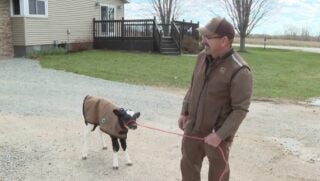General Mills aims to advance regenerative agriculture practices on 1 million acres of farmland by 2030. The company will partner with organic and conventional farmers, suppliers, and trusted farm advisors in key growing regions to drive the adoption of regenerative ag practices. A contributor to climate change, it is estimated that the complex global food system accounts for roughly one-third of greenhouse gas (GHG) emissions and as much as 70 percent of water consumption.
Regenerative ag is a method of farming deploying practices designed to protect and intentionally enhance natural resources and farming communities. These practices focus on pulling carbon from the air and storing it in the soil in addition to helping the land be more resilient to extreme weather events. General Mills will partner with key suppliers to drive adoption across key ingredients including oats, wheat, corn, dairy feed, and sugar beets.
General Mills is granting $650,000 to nonprofit organization Kiss the Ground to support farmer training and coaching through Soil Health Academies where growers will learn how to increase farm profitability, build resiliency into the land and decrease input costs using soil health practices.
“Investing in soil health and regenerating our soils has numerous benefits including water infiltration, reduced pest pressure, resilience to unpredictable weather, and reducing greenhouse gasses,” said Lauren Tucker, executive director of Kiss the Ground. “We have an opportunity to not just sustain our natural resources, but to restore them for generations to come. We can only advance the adoption of these practices that benefit people and the planet if we partner with and support our farmers.”
Today’s announcement builds upon the company’s commitment to improve soil health and to reduce its absolute GHG emissions by 28 percent across its full value chain by 2025. General Mills reported it is nearly halfway to that goal, with its GHG emissions footprint down 13 percent in 2018 compared to 2010.
General Mills also drives awareness of regenerative agriculture with consumers through its brands. For example, in 2018, Annie’s launched two limited edition products with ingredients grown using regenerative practices, and this year will offer two additional regenerative agriculture products: Macaroni & Classic Cheddar and Shells & White Cheddar.
General Mills is leading the development of measurement science to connect regenerative ag practices, like no-till and cover cropping, to environmental and economic outcomes:
- Healthy Soil: Carbon rich, biologically active soil plays an essential role in cleaning and storing water, supporting biodiversity and regulating the climate.
Above-Ground Biodiversity: Diversity in crop varieties, grazing animals, wildlife and pollinators supports resilient ecosystems that can better withstand disease, pests and climate fluctuations. - Farmer Economic Resilience: Regenerative agriculture practices can strengthen whole farm profitability and resilience over time.
- Healthy soil is the foundation for regenerative agriculture and since 2015, the company has invested more than $4 million to advance soil health initiatives.
Previous and ongoing examples of General Mills’ work include:
- Development of The Soil Health Roadmap in partnership with The Nature Conservancy, which outlines key steps to achieve widespread adoption of soil health systems on more than 50 percent of U.S. cropland by 2025. These efforts could deliver $50 billion in societal benefits annually.
- Development of a Regenerative Agriculture Self-Assessment tool to help farmers understand how their practices influence soil health, biodiversity and economic resilience.
- A strategic sourcing agreement with Gunsmoke Farms LLC to convert 34,000 acres of conventional farmland in South Dakota to certified organic acreage, using regenerative agriculture practices, by 2020.


